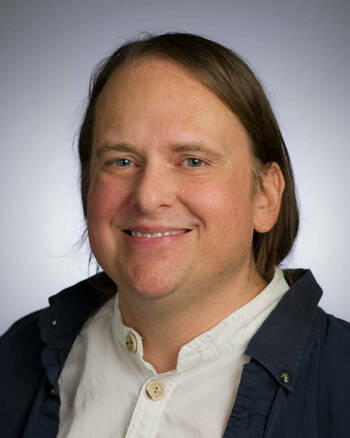In memoriam: Benjamin Radcliff, professor of political science

Benjamin Radcliff, a professor in the Department of Political Science at the University of Notre Dame, died June 10 after a long illness. He was 60.
Radcliff’s scholarly work focused on the intersection of American and comparative politics. He made significant research contributions in three primary areas: social choice theory, the political influence of organized labor and the politics of human happiness.
“He was a prolific scholar, pioneering the study of how political systems influence what he would call the ultimate dependent variable: human happiness,” said Matthew E.K. Hall, the David A. Potenziani Memorial College Professor of Constitutional Studies and director of the Rooney Center for the Study of American Democracy. “He liked to project a cantankerous, sarcastic persona, but it did little to persuade me that he was anything less than a saint.”
From Ottawa, Illinois, Radcliff received his doctorate in political science at the University of Illinois Urbana-Champaign. He held faculty positions at Rutgers University and Vanderbilt University for two years each, and was part of Notre Dame’s political science department for 30 years. During his tenure, Radcliff served as the director of graduate studies for six years and as the director of the Rooney Center from 2012 through 2013.
His book “The Political Economy of Human Happiness: How Voters’ Choices Determine the Quality of Life” detailed his research on the connection between government support for citizens and workers and overall human happiness. Radcliff also completed two edited volumes and 45 referred journal articles, 14 of which appeared in the three leading journals in political science: the American Political Science Review, the American Journal of Political Science and the Journal of Politics.
From 2019 through 2022, with department chair and professor Geoffrey Layman, Radcliff served as the co-editor-in-chief of Political Behavior — the official journal of the elections, public opinion and voting behavior organized section of the American Political Science Association. In this position, Layman said, Radcliff was known for his thorough feedback, and he often kindly explained his reasonings to authors whose manuscripts he rejected.
“Ben not only helped the journal reach new heights in terms of scholarly impact and ranking, but also was an exceedingly caring and thoughtful editor,” Layman said.
Beyond academia, Radcliff was also known for his ability to engage in enlightening conversations on subjects ranging from history and politics to music, literature, wine and arcane trivia. With his wife, Amy, Radcliff published the book “Understanding Zen,” which examined zen as a secular doctrine without any necessary relationship to Buddhism or Eastern culture. He also wrote an article on “The Beer Renaissance” in Sky, the Delta Airlines magazine.
“In short, Ben did not just study human happiness, he actively contributed to it,” Layman said.
Radcliff is survived by his wife, as well as his mother, brother and many nieces and nephews. A celebration of life is scheduled to be held in August. Those who wish to honor his memory with a donation can do so at Heifer International using the link set up by his colleagues.
Originally published by at al.nd.edu on July 3.
Latest Colleges & Schools
- Prioritizing prenatal care may decrease low birth weight outcomes in The Gambia, Notre Dame research findsA new study co-authored by University of Notre Dame researchers highlights the importance of prenatal care for improving the health of mothers and newborns, providing evidence that can inform policy.
- Partial peace deals may facilitate comprehensive accords, offering roadmap for policymakers, practitionersPartial peace agreements — deals that address targeted issues on the way to larger comprehensive accords — could provide a blueprint for peacebuilding policymakers and practitioners, according to new University of Notre Dame research.
- Notre Dame Law School launches new Veterans Law ClinicNotre Dame Law School is launching a new Veterans Law Clinic, dedicated to providing free legal assistance to U.S. military veterans in matters such as disability claims and appeals.
- City of Gary and Notre Dame’s Housing and Community Regeneration Initiative announce vision and action plan for downtown GaryThe City of Gary and the University of Notre Dame School of Architecture’s Housing and Community Regeneration Initiative announced a “Vision and Action Plan” for downtown Gary during a news conference Tuesday (May 27). The final report serves as a roadmap for Gary’s leadership to follow to reestablish the city’s building culture.
- Notre Dame Executive MBA offers scholarships to area leadersMichiana Forty under 40 honorees can receive $30,000 toward tuition for the Notre Dame EMBA program.
- Kenneth Scheve appointed dean of the University of Notre Dame’s College of Arts and LettersKenneth Scheve, the Dean Acheson Professor of Political Science and Global Affairs and the dean of social science at Yale University, has been appointed the I.A. O’Shaughnessy Dean of the College of Arts and Letters by University of Notre Dame President Rev. Robert A. Dowd, C.S.C. Scheve, who will also hold a tenured faculty position in the Department of Political Science, begins a five-year term as dean on July 1.













